2021 Composition Weekend Concert: Let Us Breathe
Friday, April 23, 2021 at 7:30 PM ET
Let Us Breathe – The music of Jeffrey Mumford and New Orchestra of Washington in Concert
Post Performance Discussion and Q&A
After the performance, a discussion and Q&A featuring Jeffrey Mumford and the musicians from the New Orchestra of Washington will be held over Zoom. Join the Zoom meeting by following this link:
Levine is committed to building new audiences for music by offering outstanding performances, master classes, and other musical events free-of-charge. This performance is offered free of charge thanks to the generosity of many donors. Please consider making a gift to support these programs.
The Composition Department of Levine Music gratefully acknowledges the generosity of The ASCAP Foundation Irving Caesar Fund and The Randy Hostetler Living Room Music Fund.
 |
Program
D’un soir trieste | Lili Boulanger
undiluted days | Jeffrey Mumford
I. a cavernous dawn of layered experience
II. of focused and reflected resonances
III. the red room (in memoriam Fred Calland)
IV. quick light spreading into the ringing air . . .
V. . . . of a cavernous dawn of layered experience
let us breathe | Jeffrey Mumford
Piano Trio in E Flat Minor | Rebecca Clarke
Rebecca Anderson, violin
Alan Richardson, cello
Ryo Yanagitani, piano
About Levine’s Composition Weekend
Welcome to all! To Levine families of composition and performance students, to musicians and music lovers, to all the faculty and their student composers and performers in this program.
To our visiting composer, Washington born and raised Jeffrey Mumford, and to pianist Grace Cho, who taught at Levine, and is Executive Director of the New Orchestra of Washington/aka NOW, and to members of the ensemble from NOW who performed the concert that included Jeffrey’s pieces last night.
The Composition Department has had annual recitals to showcase the music created by our students. Years before, Levine composer Steve Antosca and pianist Laurie Hudicek played a program of pieces by the esteemed American composer George Crumb. He came to the Friday concert and stayed to critique student pieces on Saturday morning.
In 2010, Levine alumnus and now tenured professor of music composition at Duke, John Supko, needed a place to premiere his new piece commissioned by the Meehan/Perkins Duo. This led to our continuing weekend because the morning after their concert, we had a masterclass. Since it was a percussion duo, we required our students to write for percussion.
In 2010 we had three professionals, so we were pleased to receive a grant from the DC Commission on the Arts and another from the Randy Hostetler Living Room Fund, who are still supporting our weekends. In 2011 we were awarded an ASCAP Foundation grant, and they have also continued to support us.
Last year, one of our alums. Matt Schultheis, began graduate studies in composition at Juilliard, and another, Camilo Gonzalez-Sol, will graduate from the University of Southern California. We hope that like John Supko, they will have successful careers as composers.
Since 2010, we have brought composers and performers from around the country to critique the pieces of our students as well as the student performers who play them. So, enough history, and on with the show!
– Sis Mckay, Composition Co-Chair
About the Program
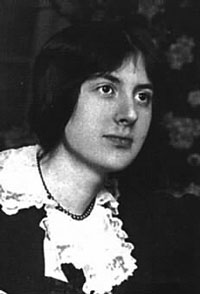 The Boulanger sisters, Nadia (1887-1979) and Lili (1893-1918) were brought up by both parents who each were musicians. The father, Ernest, had won a Prix de Rome at age 20. The mother was a Russian princess who married Ernest, her teacher at the Paris Conservatoire. Nadia, after later deciding that she had no talent as a composer, would become one of the world’s greatest composition teachers, whose many students included Aaron Copland (her first student) John Eliot Gardiner, and Elliott Carter. In 1932 she was honored with the Legion d’honneur.
The Boulanger sisters, Nadia (1887-1979) and Lili (1893-1918) were brought up by both parents who each were musicians. The father, Ernest, had won a Prix de Rome at age 20. The mother was a Russian princess who married Ernest, her teacher at the Paris Conservatoire. Nadia, after later deciding that she had no talent as a composer, would become one of the world’s greatest composition teachers, whose many students included Aaron Copland (her first student) John Eliot Gardiner, and Elliott Carter. In 1932 she was honored with the Legion d’honneur.
The composer Gabriel Fauré was a family friend who taught both girls at the Conservatoire, who discovered that Lili had perfect pitch when she was two years old. At age 19 she won the Prix de Rome with a cantata, Faust et Hélène.
Both women admired the music of Fauré and Debussy, and later Nadia would be a close friend of Stravinsky.
Although Lili, who died in 1918, would only live to be 24 because of illness, she completed 22 works, including D’un soir triste, a late piece, and about 10 works using voice. When she died at 24. here were other pieces in-progress. Lili’s Pie Jesu, composed in 1918, would be a work that was usually performed at the yearly church service that Nadia arranged in remembrance of her sister.
One of Lili’s largest pieces with a colorful instrumentation, Vieille prière bouddhique (Old Buddist Prayer), a setting of a daily Buddhist prayer, includes a tenor and a chorus (soprano, alto, tenor, bass), a sarrusophone, which is a reed instrument with a long metal body, and the usual wind and brass instruments, 2 harps, percussion, celesta, and strings.
In 2018, one hundred years after Lili died, two women musicians, Joy-Leilani Garrett and Laura Colgate, created the Boulanger Initiative in Washington, DC, to support music composed by women, in honor of Nadia and Lili. Also, the asteroid 1181 Lilith was named to honor Lili and Nadia.
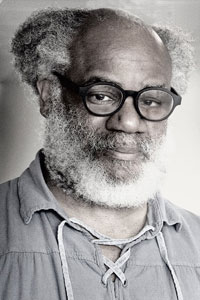 Born in Washington, D.C. in 1955, composer Jeffrey Mumford has received numerous fellowships, grants, awards and commissions.
Born in Washington, D.C. in 1955, composer Jeffrey Mumford has received numerous fellowships, grants, awards and commissions.
Awards include the “Academy Award in Music” from the American Academy of Arts & Letters, a Fellowship from the Guggenheim Foundation, and an ASCAP Aaron Copland Scholarship. He was also the winner of the inaugural National Black Arts Festival/Atlanta Symphony Orchestra Composition Competition.
Other grants have been awarded by the Ohio Arts Council, Meet the Composer, the Martha Baird Rockefeller Fund for Music Inc., the ASCAP Foundation, and the University of California.
Mumford’s most notable commissions include those from the Los Angeles Philharmonic Association and the Library of Congress (co-commission), the BBC Philharmonic, the San Antonio, Chicago & National Symphonies (National Symphony twice), Washington Performing Arts, the Network for New Music, ‘cellist Mariel Roberts, the Fulcrum Point New Music Project (through New Music USA), Duo Harpverk (Iceland), the Sphinx Consortium, the Cincinnati Symphony (twice), the VERGE Ensemble/National Gallery of Art/Contemporary Music Forum, the Argento Chamber Ensemble, the Cleveland Orchestra, the Nancy Ruyle Dodge Charitable Trust, the Meet the Composer/Arts Endowment Commissioning Music/USA, Cincinnati radio station WGUC, the Walter W. Naumburg Foundation, the Fromm Music Foundation, and the McKim Fund in the Library of Congress.
His music has been performed extensively, by major orchestras, soloists, and ensembles, both in the United States and abroad, including London, Paris, Reykjavik, Vienna, The Hague, Russia and Lithuania.
Mumford has taught at the Washington Conservatory of Music, served as Artist-in-Residence at Bowling Green State University, and served as assistant professor of composition and Composer-in-Residence at the Oberlin College Conservatory of Music. He is currently Distinguished Professor at Lorain County Community College in Northern Ohio.
Commissioned by Sonia Rothschild, undiluted days (2000, rev. 2013) was written for the Opus 3 Trio based in Washington, D.C.
The work is cast in five movements, the third (and middle) movement of which is in memory of the late National Public Radio Music Producer, Fred Calland.
The first and fifth movements act as bookends with the fifth movement elaborating on material presented in the opening movement. Additionally, the first and fifth movements are also the most rhythmic and assertive, with the second and fourth being more spacious and ethereal.
let us breathe (2020) was commissioned by the Cincinnati Symphony (with the assistance of Ann and Harry Santen) as part of its “Fanfares” project, and addresses brutality against people of color. It was written for the orchestra;s Principal cellist Dan Culnan.
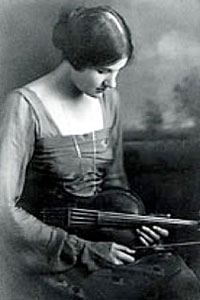 Rebecca Clarke (1886-1979) was born in England. Her mother was German and her father was American. She was educated as a composer and a violist at the Royal Academy of Music and Royal College of Music, where she was one of the first women to study composition. She also sang under the direction of Ralph Vaughan Williams. In 1910 she was one of the first women to play in a professional orchestra.
Rebecca Clarke (1886-1979) was born in England. Her mother was German and her father was American. She was educated as a composer and a violist at the Royal Academy of Music and Royal College of Music, where she was one of the first women to study composition. She also sang under the direction of Ralph Vaughan Williams. In 1910 she was one of the first women to play in a professional orchestra.
In 1916, the family moved to the United States, where in 1919 she participated in a composition competition created by Elizabeth Sprague Coolidge. Her Viola Sonata was chosen as first place and it was tied with a piece by Ernest Bloch. Some reporters thought that despite competing under her own name, her piece was actually composed by Bloch.
In 1921 she composed the Piano Trio in E Flat Minor, a three-movement work with a rich and unique harmonic language as well as driving, energetic rhythms. There is no key signature in the score, and the piece is in both E-flat Major and E-flat minor.
Her pieces included various musical styles, including impressionism, post-Romantic, and neo-Classical. Although she composed about 100 pieces, including 50 songs, only 20 were published in her lifetime. She was not able to make money from her compositions. However, she was a paid professional violist who traveled around the world with orchestras. On one trip she spent time in Hawaii.
Although she began having her pieces performed in the early part of the 20th century, her importance as a composer has just begun to be recognized. It is most certainly about time.
About the Performers
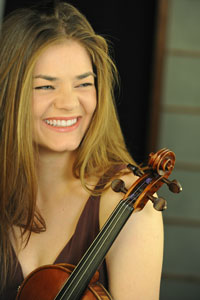 Rebecca Anderson has appeared worldwide as a recitalist, chamber musician, and educator. Known for her “incisive musicality” (The Oregonian), recent appearances include chamber music performances at Carnegie Hall and tours across Europe, Asia, and South America.
Rebecca Anderson has appeared worldwide as a recitalist, chamber musician, and educator. Known for her “incisive musicality” (The Oregonian), recent appearances include chamber music performances at Carnegie Hall and tours across Europe, Asia, and South America.
Ms. Anderson’s passion for chamber music has led to festival appearances with Music@Menlo, Chamber Music Northwest, Lake Champlain Chamber Music Festival, the Savannah Music Festival, and Music From Angel Fire. She has performed on concerts presented by the Chamber Music Society of Lincoln Center and the Philadelphia Chamber Music Society, as well as appearances at Carnegie Hall, the Kennedy Center, and Library of Congress.
As an educator and arts advocate, Ms. Anderson co-founded the Anderson-Sasaki duo in 2019, creating residencies that strengthen community through varied interactive performances and presented recitals. During the 2020-21 academic year, she is Visiting Artist at the Crane School of Music SUNY Potsdam and Interim Director of the Violin Program at Cornell University.
Ms. Anderson is founding co-director of VOTESart, a non-partisan organization that uses music to promote voter registration and civic engagement across the country. Originally from Portland, Oregon, she is an alumna of the Curtis Institute of Music, the Juilliard School, the Royal Conservatory of Music, and Ensemble Connect (formerly Ensemble ACJW).
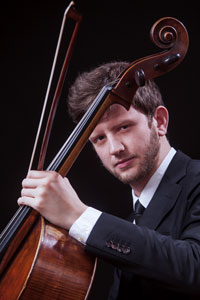 As a founding member of the award-winning Aeolus Quartet, cellist Alan Richardson has performed in diverse venues across North America, Europe, and Asia. Mr. Richardson has performed at concert series including Lincoln Center’s Great Performers, Chamber Music Society of Detroit, and Bargemusic, and at festivals including Bay Chamber Concerts, Bravo! Vail Valley Music Festival, Rockport Music Festival, and Kneisel Hall. He has collaborated with such artists as Renée Fleming, Peter Wiley, Michael Tree, and the Miró, Juilliard, and American String Quartets.
As a founding member of the award-winning Aeolus Quartet, cellist Alan Richardson has performed in diverse venues across North America, Europe, and Asia. Mr. Richardson has performed at concert series including Lincoln Center’s Great Performers, Chamber Music Society of Detroit, and Bargemusic, and at festivals including Bay Chamber Concerts, Bravo! Vail Valley Music Festival, Rockport Music Festival, and Kneisel Hall. He has collaborated with such artists as Renée Fleming, Peter Wiley, Michael Tree, and the Miró, Juilliard, and American String Quartets.
In addition to his work with the Aeolus Quartet, he holds positions as principal cellist of the New Orchestra of Washington and assistant principal cellist of Symphony in C. 2019-20 performance highlights include a concerto appearance with the Alexandria Symphony Orchestra, multiple guest performances with A Far Cry, and Aeolus Quartet features at NYC’s PROTOTYPE festival and Lincoln Center’s “Inside Chamber Music.” Along with his colleagues in the Aeolus Quartet, Mr. Richardson serves as Co-Artistic Director of the Charles Wadsworth Piano Competition.
Mr. Richardson studied at the Cleveland Institute of Music, University of Texas at Austin, University of Maryland and the Juilliard School. He currently performs on a 2016 cello by Samuel Zygmuntowicz, generously on loan from the Five Partners Foundation.
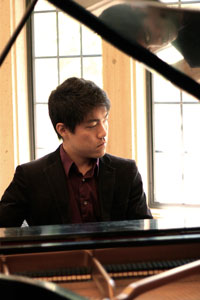 Hailed by the Washington post as “A pianist’s pianist,” Ryo Yanagitani has established himself as one of Canada’s shining artists. His success includes winning the gold medal at the 10th San Antonio International Piano Competition, where he was also given special recognition for a performance of the complete Chopin Ballades. He is also the grand prize winner of the Hugo Kauder International Piano competition and a laureate of the Minnesota International Piano-e-Competition, the Dr. Luis Sigall International Piano competition in Vina del Mar (Chile), and the Hilton Head International Piano Competition.
Hailed by the Washington post as “A pianist’s pianist,” Ryo Yanagitani has established himself as one of Canada’s shining artists. His success includes winning the gold medal at the 10th San Antonio International Piano Competition, where he was also given special recognition for a performance of the complete Chopin Ballades. He is also the grand prize winner of the Hugo Kauder International Piano competition and a laureate of the Minnesota International Piano-e-Competition, the Dr. Luis Sigall International Piano competition in Vina del Mar (Chile), and the Hilton Head International Piano Competition.
Ryo has made concerto appearances with orchestras around the world including the Baltimore Symphony Orchestra, Vancouver Symphony Orchestra, the Montreal Metropolitan Orchestra, San Antonio Symphony, Minnesota Orchestra, Hartford Symphony Orchestra, the Moroccan Symphony Orchestra, and the Tokyo Kioi Symphonietta. His performances have taken him to such venues as the Kennedy Center, The National Gallery of Art, Library of Congress, Carnegie Hall, Suntory Hall in Tokyo, and Salle Cortot in Paris among others.
In addition to his solo career, he is much sought after as a chamber musician, performing in a wide range of settings from the duo sonata repertoire to large ensembles. Ryo is frequently invited as guest pianist to chamber music festivals across the US, in the capacity of both lecturer and collaborative pianist.
A recipient of many scholarships and awards, Ryo has been endowed twice by the Canadian Arts Council with a grant as an Emerging Artist, and is a recipient of the Arthur Foote Scholarship from the Harvard Musical Association. He was also awarded the Sony Foundation of America Career Grant through the Salon de Virtuosi of New York, and a Washington Award by the S&R Foundation of Washington DC. He has also been an artist-in-residence of the Maxwell Shepherd Fund of Connecticut. Ryo is also increasingly recognized not only as a performer but as a pedagogue, and is in demand as adjudicator to competitions and as masterclass clinician in North America and Asia. He has also released two solo CDs consisting of works by Chopin and Debussy, as well as a CD in collaboration with the cellist Dai Miyata in Japan.
Ryo Yanagitani received his Doctor of Musical Arts degree from the Yale School of Music under Boris Berman, a Bachelor Degree in Piano Performance from the University of British Columbia under Doctor Henri-Paul Sicsic, and an Artist Diploma from the Cleveland Institute under Sergei Babayan. He was an instructor for the Chamber Music Program at Yale, and was a visiting Assistant Professor of Piano at the University of British Columbia in Vancouver. He directed the highly acclaimed Evermay Concert Series in Georgetown, and held the position of Artistic Director at the Ryuji Ueno Foundation in Washington DC, an organization that supports highly talented individuals in the field of the performing arts.
